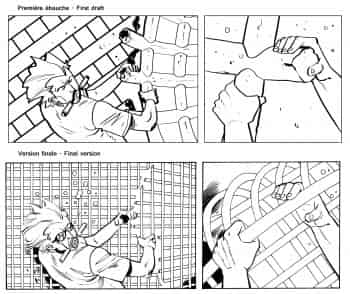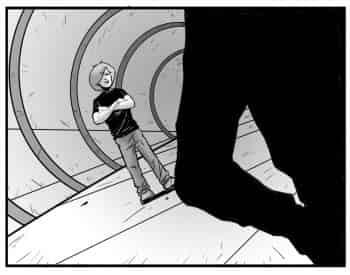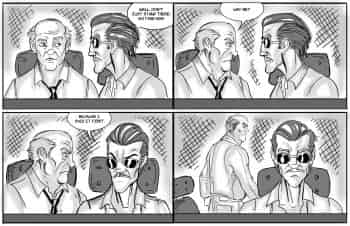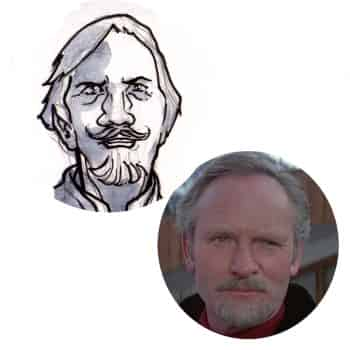Bonus
-
Touch-ups (“Psychological Warfare”—Part II)
Comics are a collaborative effort. The scriptwriter can ask for corrections to an illustration to maintain the overall consistency. We had several discussions with the illustrator about the size of the bars keeping the aircraft from entering the Bunker. The bars had to be large enough to keep intruders out but not be so massive that they couldn’t be deformed by human strength.
-
Women in control —Part III
We continue our thoughts on the definition of a strong female character. In fact the word “strong” is not entirely appropriate: strength must fit into the character’s balance of strengths and weaknesses. Josef Siroka offers a similar analysis for films: “So, feminists shouldn’t have said, ‘We want more strong female characters.’ They should have said, ‘We want weaker female characters.’ Not weak in the ‘damsel in distress’ sense of the word, but weak as in having flaws (“Redéfinir le « personnage féminin fort» », http://blogues.lapresse.ca/moncinema/siroka, Feburary 11, 2014).
On a side note, the opposite of a strong woman character is one reduced to being only a damsel in distress. When we look at the Captain America film trilogy, we see that at no point do the women need saving by the superhero.
Back to the Apatrides universe, it’s Jenny who tells Markham she wants to go to a Black Orchestra training camp. At that point, she is the only character in the stories already posted, to volunteer for the camps and be fully aware of what she’s requesting.
-
What Are They Saying? “Showdown in the Sun” – Part III
-
Where does that character come from? The example of Richard Krugger
-
Going beyond duality: The experience of Lost
Columnist Davin Faraci gave his analysis of comments made by Javier Grill–Marxauch about his writing for the TV series Lost. Faraci ends on this note: “Unfortunately the ways the show dealt with these topics—like the Manichean battle between good and evil—simply weren’t up to the level of what was happening in seasons one through three.”(“Walt Was Psychic: An Amazing Look at the True Development of LOST,” http://birthmoviesdeath.com, March 24, 2015). In our view, this is partly accurate, but the series’ greatest shortcoming was in the psychological development of the Man in Black. One episode uses flashbacks to try to show his motivations and his relationship with Jacob and his mother. It shows a man who really wants to leave the island, but whose dreams are crushed by his mother. Because of this, he kills her, and his brother seeks to destroy him. From a man who craves freedom, he evolves into a creature of destruction with only a single motivation. But his origin story showed a more nuanced person. And his brother, Jacob, wasn’t a compassionate character. In short, the series, rather than developing a more nuanced relationship between the two, adopted a classic Manichean duality, where the viewer cannot feel any compassion for one party. This was a missed opportunity for a much richer ending to this TV series that had otherwise taken so many risks during its run.







